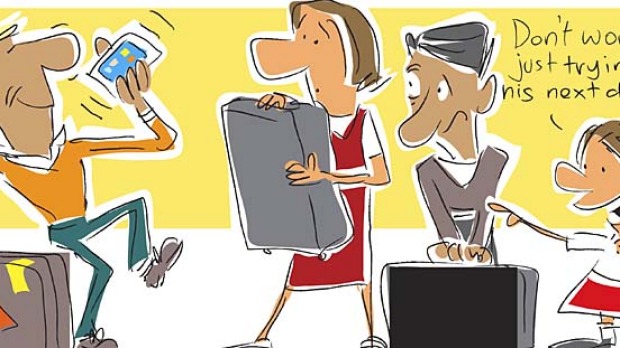
From finding last-minute deals to virtual tours of the world, smartphone applications continue to proliferate. Here, we select the best of the latest releases.
FROM a trickle to a torrent, the release of new travel apps has become such a regular occurrence, it is hard to keep up.
Destination information, booking services, trip planners and niche travel apps are lining up to challenge App Store favourites such as TripAdvisor, Urbanspoon and Webjet.
There are apps (or applications for mobile devices such as iPhones, iPads and Android smartphones) for everything from booking a cab in a strange city to keeping track of your travel vaccinations - seek and you will probably find.
Apps for booking
Hotels.com recently launched a user-friendly iPad app that allows travellers to search and book about 140,000 hotels around the world in a choice of more than 30 languages.
The free app provides fast access to about 20,000 last-minute deals, more than 2.5 million user reviews and last-minute bookings based on location, so it should prove a strong rival to other hotel booking apps.
The emerging trend for hotel booking apps is "mobile exclusive", where smartphone and tablet computer users can access deals that are theoretically not available through other channels.
Apps for inspiration
Some travel apps are as much about inspiration as they are about providing practical information.
Abercrombie & Kent's new World of A&K iPad app allows users to virtually visit 26 "iconic destinations" around the world using multimedia content.
Travellers can use the app's interactive map to display the places they've visited or wish to visit and can then export the map to Google Earth to share with family and friends.
In Australia, the new, visually rich Australia: Where to Go app has multimedia imagery and information such as top 10 lists that provide inspiration for trip planning as well as practical information once on the road.
Users can filter the information using criteria such as family, luxury, urban and wildlife to find places and attractions that suit their interests.
Apps for information
TripAdvisor is taking on destination-guide publishers such as Lonely Planet with free mobile city guides, so far available for 20 major cities.
Available on Android phones (iPhone apps pending), the guides are automatically synced with the latest TripAdvisor content or they can be used offline, so travellers can avoid expensive roaming charges.
More and more destinations are now offering their own apps, to provide information for visitors on what to see and do.
Tourism Victoria recently released a stylish Play Melbourne app with about 500 listings of cafes, bars, restaurants and shops in Melbourne, while Tourism Western Australia has just launched an Experience WA app with more than 7000 listings.
Even smaller areas are putting together their own offerings: the Mudgee region north-west of Sydney has released a free iPhone app about local wineries and attractions, while the Pacific coast has created an iPhone app that covers the tourist drive from Sydney to Brisbane.
Apps for niches
Food- and wine-oriented travellers can get free information on thousands of vineyards, cellar doors, restaurants and food producers through a new iPhone app, VisitVineyards.
For nature-minded travellers, the NSW National Parks and Wildlife Service has created a whale-watching guide, Wild About Whales, for iPhones and Androids, with information on recent sightings, different types of whales and whale behaviour.
This year's Australian ski season has also seen the release of several snow apps, allowing skiers to check conditions, record their runs and find their friends.
Mount Buller is taking it one step further with a coming summer version, allowing mountain bikers to track their rides.
Apps for the future
The Dutch airline KLM has launched a clever TripShake app that allows travellers to find inspiration by giving their phone a shake.
Travellers can enter criteria such as travel dates or leave their options open and then shake their phone to get a destination to consider.
Another shake will bring up another destination and travellers can keep shaking until they find something that grabs their interest.
Overseas hotel-booking sites are also providing a glimpse of what future apps may offer, incorporating augmented reality and high-quality virtual tours into their apps, so travellers can almost experience a hotel before they book.
Searches using mobile devices now account for 14 per cent of Google's traffic — up from just 4 per cent a year ago.
Speaking at the Travolution Summit in London last month, the director of mobile for Google, Ian Carrington, said mobile represented the future, increasingly cannibalising "desktop business".
Carrington said Google research showed more people were using mobile internet than apps, with 50 per cent of mobile users starting their interaction with a search.
But apps remain important in a continuing relationship between a consumer and a company or destination.
 Follow Traveller on Twitter @FairfaxTravel
Follow Traveller on Twitter @FairfaxTravel